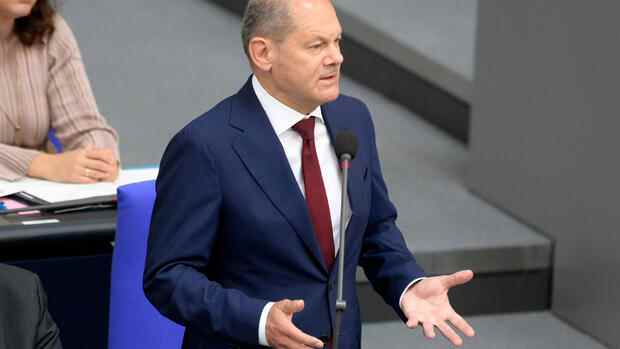The chancellor swears that the Germans will face hard times.
(Photo: IMAGO/Future Image)
For the first time, Olaf Scholz comes together with the entire top of the German economy at the craft fair. The expectations are huge that the Federal Chancellor will explain to industry, employers and the skilled trades how things should continue. The economic turning point is in full swing. Inflation is high, energy prices are going through the roof, there is a risk of a wage-price spiral, and the corona pandemic is already paralyzing the first companies again.
With Chancellor Angela Merkel, the meetings in Munich were purely routine appointments. Both sides knew that nothing could be expected of reforms. The chancellor felt that she had already made all the important issues a top priority. Still, not much happened. The grand coalition passed one make a wish law after the other. But you could afford it. The order books of the trades were jam-packed, and the industry still achieved a trade surplus that made Donald Trump blush in the face.
Today Germany is in an economic descent. What vacationers and business travelers are experiencing at German airports and train stations is a disaster. What is really depressing, however, is the quiet farewell to the top of the world economy. The business model of export strength is gone and no German company makes it into the ranking of the 100 most valuable companies in the world. So we can no longer afford meetings like the “concerted action” in the Chancellery last week.
Trade unions, employers and politicians have spoken to each other. Good this way. But nothing more than hot air came out. The word wage restraint hasn’t left the unions, employers haven’t pledged to secure jobs just in case, and the chancellor could have said something about what the state intends to do next to fight inflation. Yes he would. But he hasn’t. “That’s it.”
Top jobs of the day
Find the best jobs now and
be notified by email.
The chancellor swears that the Germans will face hard times. But that’s not enough. Scholz must finally tell the economy specifically what he is planning for the possible disaster winter. Otherwise he stands there like Merkel with (almost) empty hands. Some things are done. The EEG surcharge is history, the Bundestag passed the Easter package on Friday, which will speed up the expansion of renewable energies. But what comes next?
How does Scholz imagine gas triage?
First, there is the issue of the gas crisis. The Federal Minister of Economics is working at full speed on solutions, only the memory will not be filled in the coming months. The companies are rightly asking how Scholz imagines gas triage should Russian President Waldimir Putin get serious. The first companies are already dying silently in view of the rapidly increasing energy prices.
Scholz should not only explain to the economy whether there will be any relief here. The government should come to a moratorium on stress. It is now about the simple but crucial question of how the continued operation of the country can be organised. Meanwhile, politicians in Brussels and Berlin are working tirelessly to implement the green transformation of the economy, as if there were no energy crisis and inflation.
>> Read here: The robot as savior? This is what a strategy against unemployment could look like
The shortage of skilled workers is further weakening the economy. The hurdles for people outside the EU to come to Germany are too high. It will be a long time before the traffic light coalition finally comes up with a modern immigration law. The Chancellor does not want to talk about a longer working week or lifetime.
That could scare the citizens. So the economy will be curious about his suggestions as to where he wants to get the craftsmen to install all the combined heat and power pumps.
The digital strategy is crumbling
The question remains as to how companies are to earn the money in the future so that politicians can finance the fight against inflation and relief for citizens, such as the nine-euro ticket or the fuel discount. The expectation that the self-proclaimed progressive coalition would bring new impetus to the country through digitization is crumbling.
Digital Minister Volker Wissing has postponed his strategy until after the summer break. He thinks the creative ideas and flagship projects of the other ministries are lacking. The hunt for the culprit has begun when we keep having to call our cell phones on the train: “I can’t hear you anymore.”
At the G7 summit in Elmau, Olaf Scholz showed: I can be an international chancellor. Now he has to prove it in the country too.
More: “Something went wrong with airlines” – Heil sees responsibility for chaos in companies
